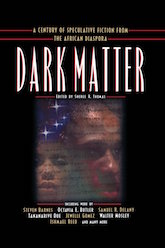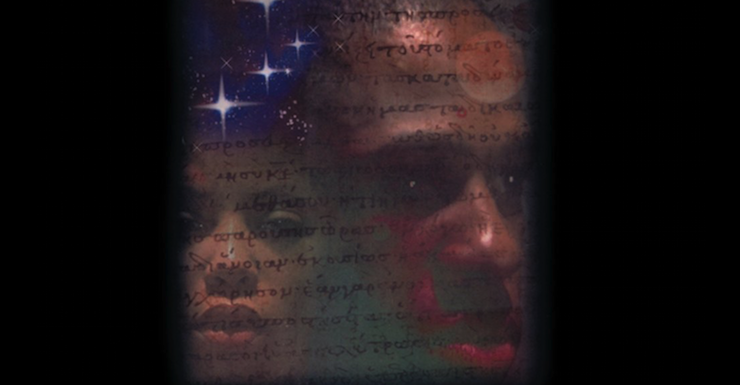In February of 2016, Fantastic Stories of the Imagination published an essay by me called “A Crash Course in the History of Black Science Fiction.” Since then Tor.com has published my in-depth essays on eleven of the 42 works mentioned. The original “Crash Course” listed those 42 titles in chronological order, but the essays skip around a bit. This twelfth column is devoted to “The Space Traders,” activist and law professor Derrick Bell’s story of aliens swapping their advanced technology for the guaranteed delivery to them of all African Americans.
WAIT, WHAT?
 That’s right. These aliens are slave traders. Or they seem to want to be. They land on the first of January and make their offer: gold, environmental remediation, and cheap, clean nuclear power in exchange for “every American categorized as black on birth certificate or other official identification.” The offer’s good, they declare, for a little over two weeks; they’ll collect on the day we celebrate the birth of Martin Luther King, Jr. Though legislation hastily introduced to enable the transaction drafts all U.S. blacks into what it calls “special service,” there’s very little doubt what’s being euphemized.
That’s right. These aliens are slave traders. Or they seem to want to be. They land on the first of January and make their offer: gold, environmental remediation, and cheap, clean nuclear power in exchange for “every American categorized as black on birth certificate or other official identification.” The offer’s good, they declare, for a little over two weeks; they’ll collect on the day we celebrate the birth of Martin Luther King, Jr. Though legislation hastily introduced to enable the transaction drafts all U.S. blacks into what it calls “special service,” there’s very little doubt what’s being euphemized.
FREE! ONLY A DOLLAR!
That little doubt about the horrid nature of what the aliens are asking for is about as valid as the argument that antebellum enslavement constituted a necessary path to religious salvation. In other words, it’s a proposition meant to comfort the comfortable. Bell’s protagonist, conservative black pundit Gleason Golightly advocates acting as if there are secret benefits awaiting those the aliens abduct. His strategy gets rejected by a Jesse Jackson-like leader in favor of honesty and in the end, the trade is made.
According to the author, while many whites fight courageously to prevent this heinous deal from going down, many more support it as the only solution to the country’s problems. And in the opinion of most blacks, he says, the story’s pessimistic conclusion is a foregone one.
THE TIME, AND A RECORD OF THE TIME
“The Space Traders” was first published in 1992. Though not hailed as a post-racial period with the same verve as the eight years of the Obama administration were, this era was supposedly an enlightened one. The legal triumphs of the Civil Rights Movement looked like they were here to stay. Lynching had taken what seemed to be a permanent vacation. Given this generally positive milieu, why would Professor Bell imagine such a negative outcome for his story’s conflict?
Back in the late 60s and early 70s, when I was flower-power-digging hippie, my mother, at the unimaginably ancient age of 37, told me that long-lived experience gives you a different perspective on history. She explained that over decades you discern patterns, arcs, swinging pendulums of behavior, values, and social tendencies.
In 1992, Bell was 62. My age now, as I write this.
And now, as I write this, the conclusion of “Space Traders” seems all too likely.
COSMIC SLOP
The story’s next appearance was as a segment of the 1994 TV anthology Cosmic Slop. Reginald Hudlin directed a 33-minute sequence dramatizing the aliens’ landing and various meetings of clueless executives and bureaucrats leading up to the government’s acquiescence. Colorism and the plight of interracial couples are taken into account as well. Though George Clinton and Casey Kasem have cameos, a moonwalking Michael Jackson impersonator is probably more representative of Cosmic Slop’s low-grade production values.
And yet, despite the show’s laughably cheap special effects, “Space Traders” provided viewers an interesting perspective on race and expediency. And soon the story increased in relevance.
In 2000, Sheree Renée Thomas included it in the first volume of her groundbreaking Dark Matter books, along with works by Samuel R. Delany, Octavia E. Butler, Steven Barnes, Tananarive Due, and others. These anthologies, as I point out in my “Crash Course” article, constitute “an even crashier-course in the history of black SF.”
But the height of notoriety for “The Space Traders” was most likely reached in 2012. That’s when a host of far-right news sites who were following the example of Breitbart.com set their gunsights on a 1991 video of Barack Obama literally, physically embracing its author. Castigating the short story as a “racist-commie-sci-fi extravaganza,” reviewer Kurt Schlichter claimed it revealed the president’s “extremist” views. Posts on IMDb and other public forums lambasted both print and screen versions in similar terms.
META-METAPHORS
Teachers and writers commenting on the inevitability and appropriateness of Afrodiasporic science fiction often refer to the many parallels between the genre’s typical tropes and the historical experiences of black people. We were abducted to alien shores, for instance, our bodies curbed and defiled, the boundaries of our identities erased. And so on. SF gives us a means of describing these experiences metaphorically, with faster-than-light rockets substituting for slavers’ ships and genetic modification—or sometimes the lack thereof—for branding. But what Bell has done is to re-insert the original disturbing circumstances into the picture. Upon reaching the aliens, his “special service” sacrifices are stripped of their clothing and bound in chains, just as my ancestors were. Are the narrative choices the author makes, the plot he depicts, bold or merely bald? To my mind, the recursiveness of “Space Traders” enriches what’s there to be read.
THE COLD INEQUALITIES
The action of “Space Traders” turns upon the legal fiction of an involuntary “special service,” a legislative construction as convenient to its creators as the “three-fifths of a man” formula for including this country’s enslaved Africans in census totals was in its time. An activist and a founder of Critical Race Theory, Bell knew that these sorts of lies were meant to bolster capitalism, white male privilege, and all who benefit therefrom. And he knew that they can endure for decades, even for centuries. So, too, can the story he wrote illustrating the devastating possibilities of their effects.
 Nisi Shawl is a writer of science fiction and fantasy short stories and a journalist. She is the author of Everfair (Tor Books) and co-author (with Cynthia Ward) of Writing the Other: Bridging Cultural Differences for Successful Fiction. Her short stories have appeared in Asimov’s SF Magazine, Strange Horizons, and numerous other magazines and anthologies.
Nisi Shawl is a writer of science fiction and fantasy short stories and a journalist. She is the author of Everfair (Tor Books) and co-author (with Cynthia Ward) of Writing the Other: Bridging Cultural Differences for Successful Fiction. Her short stories have appeared in Asimov’s SF Magazine, Strange Horizons, and numerous other magazines and anthologies.










